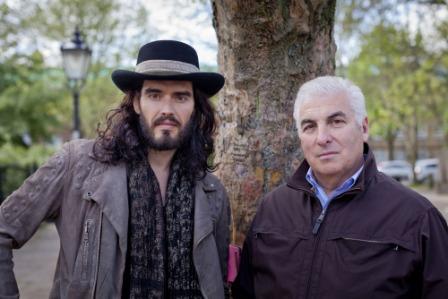Because Brand has become something of a brand – the hair, the clothes, the pantomime gait, the post-Carry On banter – he can be hard to take seriously. Nevertheless, I’ve been an admirer since his jaw-droppingly risqué appearances on Big Brother’s Big Mouth in the mid-Noughties. It was obvious that this man loved the English language and had a ribald wit that wasn’t going to be contained by Big Brother’s sister show for long. So it’s gratifying to see that this engaging documentary has Brand at least partially escaping a character he’s now also thoroughly milked in Hollywood, in order to investigate a matter close to his heart.
Ten years ago, Russell Brand kicked drink and drugs. A year ago he saw his friend Amy Winehouse (Brand pictured below with Mitch Winehouse) die at the same age he had begun his sober new life. The question of whether he could have done anything to save her was clearly the primary motivating force behind his desire to see if - with the right approach from the authorities - she could have been saved. But even with this personal dimension we could have still ended up with just another self-promotional exercise in which the actor and comedian tore about the place, jabbering excitedly, gesticulating insanely and putting the fear of God into cowering recovering addicts.
 Instead we got Brand as crusading knight, striding purposefully into the offices of unsuspecting medical professionals and sitting down with huddles of users who appeared conveniently indifferent to his celebrity status. Both groups either gave him the evidence he was after to support his suspicions, or - in the case of one NHS Doctor - ended up falling back on the stock cop-out of the defeated (“We’ll have to agree to disagree”) when Brand refused to let go of his bone of contention. In essence, this bone was that it’s not a great idea to give drugs to people who are trying to give up drugs. Medically proscribed methadone keeps addicts “stable” when all they want to do is get high. So the majority top up their medication with the very substances they are trying to abstain from. Given that most of these addicts are from the lower echelons of society, they then end up having to steal in order to support their habit.
Instead we got Brand as crusading knight, striding purposefully into the offices of unsuspecting medical professionals and sitting down with huddles of users who appeared conveniently indifferent to his celebrity status. Both groups either gave him the evidence he was after to support his suspicions, or - in the case of one NHS Doctor - ended up falling back on the stock cop-out of the defeated (“We’ll have to agree to disagree”) when Brand refused to let go of his bone of contention. In essence, this bone was that it’s not a great idea to give drugs to people who are trying to give up drugs. Medically proscribed methadone keeps addicts “stable” when all they want to do is get high. So the majority top up their medication with the very substances they are trying to abstain from. Given that most of these addicts are from the lower echelons of society, they then end up having to steal in order to support their habit.
Brand understood the insanity of this approach because his path to recovery had been through rehabilitation. In other words; cold turkey with no trimmings. However, complete abstinence was backed up by plenty of emotional support, art therapy and practical tasks to ready him for the real world he would need to return to. Yet the methadone method - which can never be anything more that a sticking plaster over a gaping wound – remains the way most addicts are processed by the state, despite the fact that the vast majority of domestic break-ins and muggings in the UK today are now committed in order to support drug habits.
As well as being an unswerving interrogator of medical professionals (including the aptly named brain specialist, Professor Nutt), Brand had no problem putting all the addicts he spoke to at their ease with his empathic and relaxed approach. And thus they were happy (if that’s the right word) to admit that they topped up their inadequate medication with “proper drugs” and alcohol. It also helped that he was so open about his past and, in fact, his present. At one point an addict handed him a scrunched-up piece of paper containing some heroin. Staring at what looked like an ugly poisonous bloom in his cupped hands, Brand admitted his heart rate had increased and, yes, he was tempted. It was a salient reminder of the battle that every addict faces every day of their lives.
It gradually became clear as this film unfolded, that if the government shifted their focus to rehabilitation centres, vast amounts of money would be saved in the long term. Even prison rehabilitation programs result in as many as 50 per cent of users remaining clean on release: that’s 50 per cent fewer criminals on our streets.
Even if the subject matter or the presence of the Wild-Haired One didn’t tempt you, there was a priceless moment when Peter Hitchens – taking the line that drug addicts are just rich boys with too much time on their hands – asked Brand if he should have been more responsible for his actions. Brand fires back, “Of course people are responsible for their actions. You’re responsible for writing for a bigoted newspaper.” A perfect moment in an eye-opening film.















Add comment